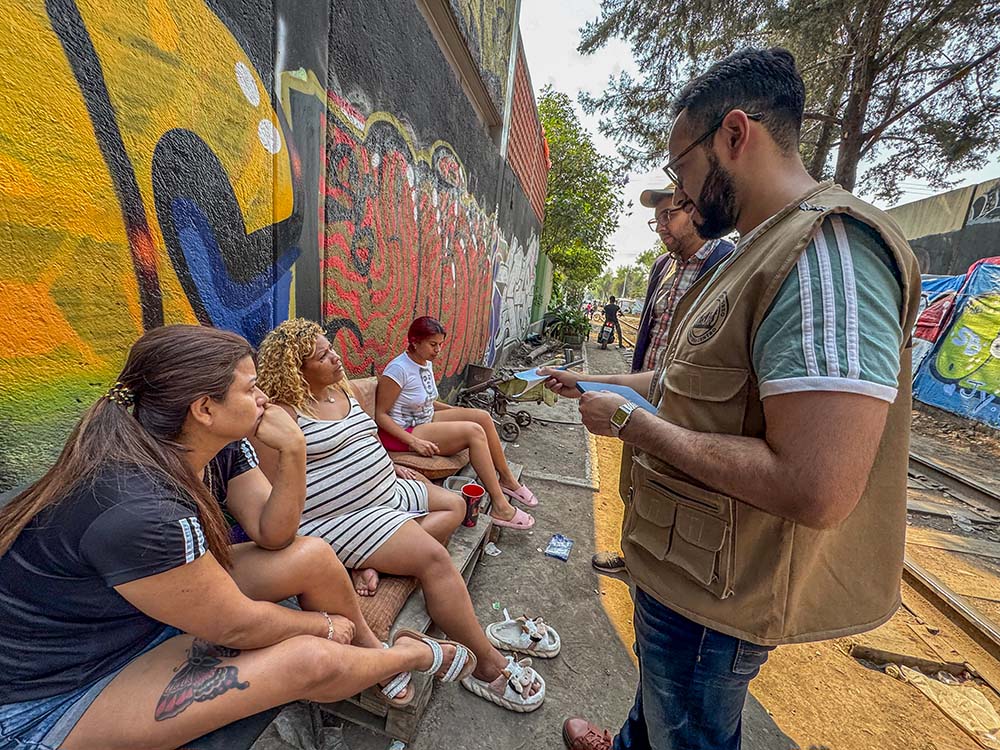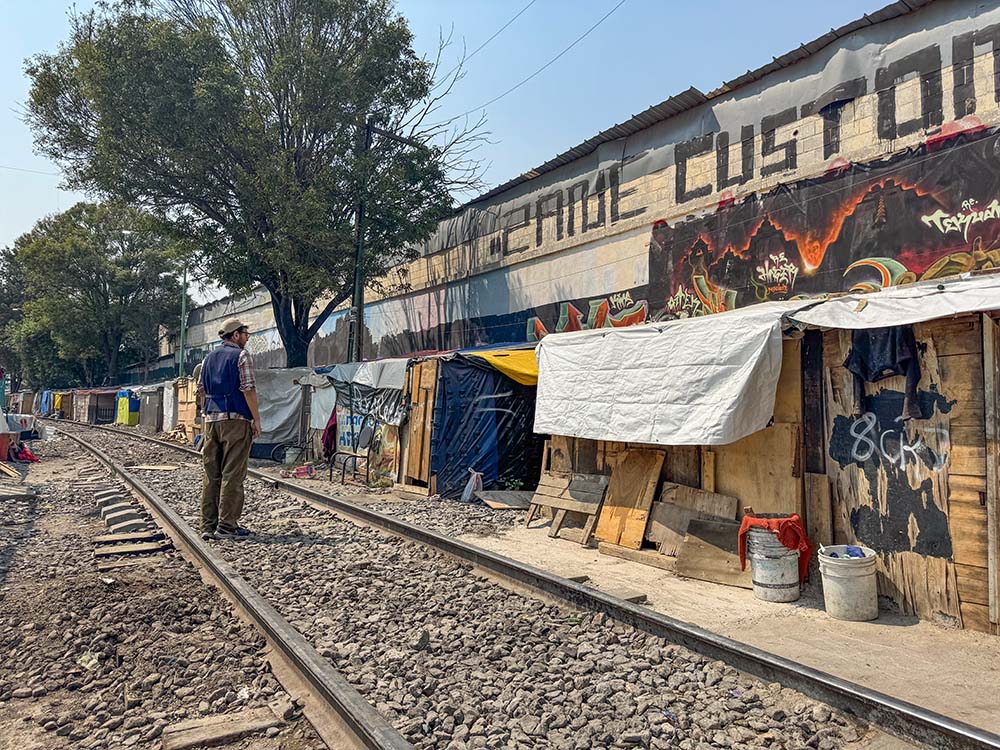
Workers from CAFEMIN, a shelter for women and families run by Josephine sisters in Mexico City, check in on the welfare of migrants living in a camp near the train tracks. Some were weighing returning home since they said they can't head north to the U.S., and Mexico makes it difficult for them to obtain documents to work and survive. (GSR photo/Rhina Guidos)
Jesús Ricardo Rojas Romero took a seat on the railroad tracks, close to the little cardboard and plastic shacks in Mexico City where many of his fellow Venezuelans live in a makeshift camp. Wanting to offload his worries, he began to tell his story.
He's been gone from home for two years, has two children, talks to them whenever he can, whenever a power outage in his native Venezuela doesn't prevent his call from getting through.
He desperately wants to help them financially, but without documents to legally work in Mexico, the best he can do is take odd jobs here and there, play a guitar someone has let him borrow to earn some tip money, and pray that he makes it through the day without going hungry. Staying in Mexico has been tough, he admitted.
With international humanitarian help drying up, workers from the nearby CAFEMIN shelter for migrant women and families — a ministry of the Josephine sisters in Mexico City — seem to be the last of the friendly faces left for desperate migrants in Mexico like Rojas. Unable to enter the U.S. to seek asylum, many are finding themselves homeless, jobless, and now stuck and unwanted in an increasingly unfriendly Mexico, a place famous for its hospitality to strangers.
A 2023 study by Oxfam Mexico found that seven out of 10 Mexicans believe immigration into the country has become excessive, with more than half saying that the government should not provide migrants humanitarian help. The study also said Mexican society, which has benefited economically from waves of its migrants to the U.S., has come to perceive immigration as a "generator of problems."
Advertisement
On my most recent visit in early April, Mario Monroy, CAFEMIN's outreach coordinator, took me to the camp where we met Rojas and other folks who've felt the brunt of not just public opinion, but also of policies that have brought even more uncertainty into already unstable lives.
Some were considering a return home after hearing that Josephine Sr. María Magdalena Silva Rentería, CAFEMIN's executive director, was working with the Mexican government on providing transportation for Venezuelan nationals who wanted to go back.
Others were weighing whether to take a risk and continue the journey toward the U.S. but also worried about being sent someplace worse, like El Salvador, if caught by U.S. immigration authorities. It seemed clear to them, no matter what Mexican government officials said, that sentiment against migrants is growing.
It's hard to say how much the government's increasing animus toward migrants comes from fear of tariff hikes if they don't toe the line of the Trump administration on immigration, or whether it's driven by criticism government officials are receiving from the populace.

Mario Monroy, outreach coordinator at CAFEMIN, a shelter for women and families run by Josephine sisters in Mexico City, greets a woman living inside a shack April 1, 2025, at a camp migrants have set up near train tracks. Monroy and other workers from the nearby shelter check in on their welfare and provide information as well training for temporary work for migrants. (GSR photo/Rhina Guidos)
Mexico, which has hailed its migrants as heroes and even composed songs about them as noble protagonists, has become a place where xenophobia is on the rise. The Spanish-language network Univision aired a report in December 2022 showing how private Facebook groups have promoted anti-immigrant narratives of Mexico being invaded by Venezuelans, Central Americans, Africans and Haitians, something fueled by lies presented as news from right-wing outlets from the U.S.
To be in the midst of migrants these days is to stare into the face of the cruelest side of humanity, Monroy told me. And it's something that's rapidly expanding beyond the U.S. to the rest of the Americas, with some of it driven by social media platforms such as X.
Monroy said he held hope that things would change, that people will start to see how their views are being shaped by those seeking to advance themselves, driving a wedge between migrants and others to achieve it.
It's a pity, he said, not just for the migrants, but for those who reject them.
"I would tell people to open themselves up to [brotherly] love" by interacting with migrants, he said, because on the other side they might find the kind of surprises Mexico loves: good food and good stories.






